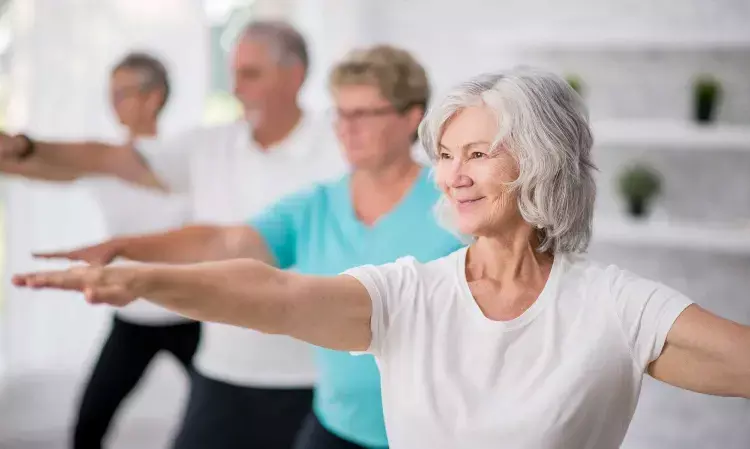- Home
- Medical news & Guidelines
- Anesthesiology
- Cardiology and CTVS
- Critical Care
- Dentistry
- Dermatology
- Diabetes and Endocrinology
- ENT
- Gastroenterology
- Medicine
- Nephrology
- Neurology
- Obstretics-Gynaecology
- Oncology
- Ophthalmology
- Orthopaedics
- Pediatrics-Neonatology
- Psychiatry
- Pulmonology
- Radiology
- Surgery
- Urology
- Laboratory Medicine
- Diet
- Nursing
- Paramedical
- Physiotherapy
- Health news
- Fact Check
- Bone Health Fact Check
- Brain Health Fact Check
- Cancer Related Fact Check
- Child Care Fact Check
- Dental and oral health fact check
- Diabetes and metabolic health fact check
- Diet and Nutrition Fact Check
- Eye and ENT Care Fact Check
- Fitness fact check
- Gut health fact check
- Heart health fact check
- Kidney health fact check
- Medical education fact check
- Men's health fact check
- Respiratory fact check
- Skin and hair care fact check
- Vaccine and Immunization fact check
- Women's health fact check
- AYUSH
- State News
- Andaman and Nicobar Islands
- Andhra Pradesh
- Arunachal Pradesh
- Assam
- Bihar
- Chandigarh
- Chattisgarh
- Dadra and Nagar Haveli
- Daman and Diu
- Delhi
- Goa
- Gujarat
- Haryana
- Himachal Pradesh
- Jammu & Kashmir
- Jharkhand
- Karnataka
- Kerala
- Ladakh
- Lakshadweep
- Madhya Pradesh
- Maharashtra
- Manipur
- Meghalaya
- Mizoram
- Nagaland
- Odisha
- Puducherry
- Punjab
- Rajasthan
- Sikkim
- Tamil Nadu
- Telangana
- Tripura
- Uttar Pradesh
- Uttrakhand
- West Bengal
- Medical Education
- Industry
Exercise may treat long COVID-induced diabetes, depression

BATON ROUGE, Louisiana - While no medically recognized treatment exists for Long COVID, exercise may break the vicious cycle of inflammation that can lead to developing diabetes and depression months after a person recovers from the virus.
"We know that Long COVID causes depression, and we know that it can increase blood glucose levels to the point where people develop diabetic ketoacidosis, a potentially life-threatening condition common among people with type 1 diabetes," said Candida Rebello, Ph.D., a research scientist at Pennington Biomedical Research Center. "Exercise can help. Exercise takes care of the inflammation that leads to elevated blood glucose and the development and progression of diabetes and clinical depression."
It's unclear how many people suffer from Long COVID. But estimates range from 15 percent to 80 percent of the people infected. Based on those figures, it's possible that as many as 1 million of Louisiana's residents suffer from Long COVID.
Long COVID causes what the Centers for Disease Control describes as "a constellation of other debilitating symptoms" including brain fog, muscle pain, and fatigue that can last for months after a person recovers from the initial infection.
"For example, a person may not get very sick from COVID-19, but six months later, long after the cough or fever is gone, they develop diabetes,' Dr. Rebello said.
One solution is exercise. Dr. Rebello and her co-authors describe their hypothesis in "Exercise as a Moderator of Persistent Neuroendocrine Symptoms of COVID-19," published in the journal Exercise and Sport Sciences Reviews.
"You don't have to run a mile or even walk a mile at a brisk pace," Dr. Rebello said. "Walking slowly is also exercising. Ideally, you would do a 30-minute session of exercise. But if you can only do 15 minutes at a time, try to do two 15-minute sessions. If you can only walk 15 minutes once a day, do that. The important thing is to try. It doesn't matter where you begin. You can gradually build up to the recommended level of exercise."
"We know that physical activity is a key component to a healthy life. This research shows that exercise can be used to break the chain reaction of inflammation that leads to high blood sugar levels, and then to the development or progression of type 2 diabetes," said Pennington Biomedical Executive Director John Kirwan, Ph.D., who is also a co-author of the paper.
https://journals.lww.com/acsm-essr/Abstract/2022/04000/Exercise_as_a_Moderator_of_Persistent.2.aspx
Virus,Candida Rebello,Pennington Biomedical Research Center,blood glucose,Exercise and Sport Sciences Reviews,COVID 19,John Kirwan,
Hina Zahid Joined Medical Dialogue in 2017 with a passion to work as a Reporter. She coordinates with various national and international journals and association and covers all the stories related to Medical guidelines, Medical Journals, rare medical surgeries as well as all the updates in the medical field. Email: editorial@medicaldialogues.in. Contact no. 011-43720751
Dr Kamal Kant Kohli-MBBS, DTCD- a chest specialist with more than 30 years of practice and a flair for writing clinical articles, Dr Kamal Kant Kohli joined Medical Dialogues as a Chief Editor of Medical News. Besides writing articles, as an editor, he proofreads and verifies all the medical content published on Medical Dialogues including those coming from journals, studies,medical conferences,guidelines etc. Email: drkohli@medicaldialogues.in. Contact no. 011-43720751


